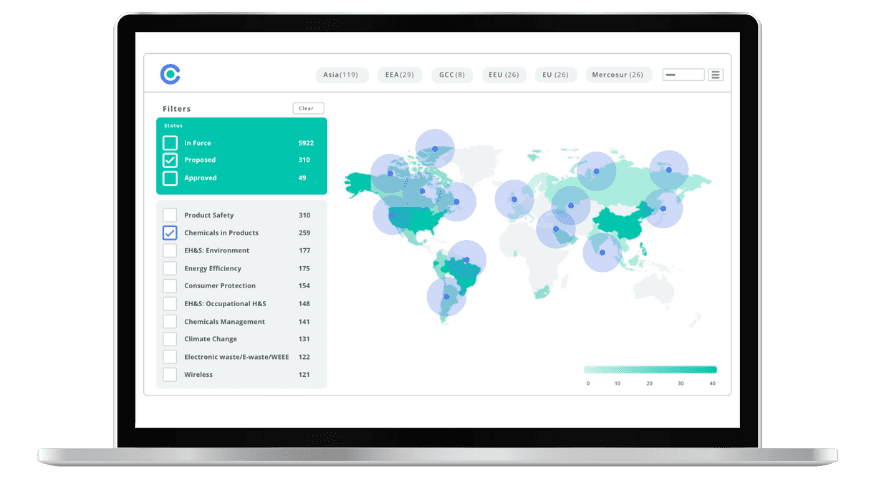
Beyond Recycling: Taiwan’s Next Green Leap with the Draft Resource Circulation Promotion Act

This blog was originally posted on 1st July, 2025. Further regulatory developments may have occurred after publication. To keep up-to-date with the latest compliance news, sign up to our newsletter.
AUTHORED BY GISELLE CHIA, REGULATORY COMPLIANCE ANALYST, COMPLIANCE & RISKS
A Paradigm Shift Towards Resource Circulation
Taiwan’s primary legislation for sustainable development, the Resource Recycling Act (enacted 2002, last amended 2009), is undergoing significant amendments.
Driven by global resource crisis, climate change, UN’s Sustainable Development Goals (SDGs), and net-zero emission commitments, Taiwan seeks to align with international trends like the EU’s New Circular Economy Action Plan (2020), which emphasizes product sustainability and circularity from the design stage.
The core objective is a shift from end-of-pipe waste management to full life-cycle resource circulation, aiming for maximized resource circulation benefits and minimized final waste disposal. As such, the Ministry of Environment has proposed significant amendments to the legislation, including renaming it as the Resource Circulation Promotion Act.
Key Pillars of the Draft Amendments: What’s New?
Ecodesign for Sustainable Products: Green Design and Product Lifespan Extension
The central competent authority is authorized to establish ecodesign guidelines for products, including mandatory regulations for products of specified categories or scales. Heavily influenced by the EU’s Ecodesign for Sustainable Products Regulation (ESPR), this draft amendment aims to enhance product sustainability, improve resource efficiency and extend product lifespans.
Elements in the ecodesign guidelines and/or regulations will include:
- Using single materials or materials that are easily decomposable, dismantlable, or suitable for circular utilization;
- Using specified ratio or quantity of recycled materials;
- Ease of repair, upgradability, or enhanced durability;
- Prohibition or restriction on the use of environmentally hazardous substances; and
- Other design elements that reduce energy and resource consumption, and minimize waste throughout the product life-cycle (e.g. minimum energy efficiency requirements, adoption of standardized specifications).
Articles, Packaging, and Containers: Reduction, Reuse, Extended Use and Prohibition
- Reuse of Packaging and Containers: The central competent authority is empowered to mandate the reuse of packaging and containers of designated articles by setting specific targets and methods. Manufacturers, importers, or sellers of designated articles will be required to submit and implement a reuse plan.
- Reduction of Packaging: Similarly, the central competent authority can mandate the reduction of packaging of designated articles. This involves setting specific targets, spatial ratios, layer numbers, material types and quantities used in the packaging used for the transport, display and sales of designated articles.
- Extended Use of Articles (Extended Producer Responsibility): The central competent authority can mandate the extended use of designated articles, and set out the relevant objectives and methods. Manufacturers, importers, vendors, or providers of designated articles are subject to extended producer responsibility (EPR), including the provision of collection services, refill and reuse, leasing, deposit refund, or buy-back services, repair services, and minimum warranty period.
- Reduction of Articles or their Packaging and Container: The central competent authority is empowered to mandate certain enterprises (e.g. wholesale retailers, hospitality industry, schools) to reduce the use of certain single-use articles or their packaging and containers through setting specific targets and methods. Designated enterprises will be required to submit and implement a reduction plan.
- Prohibition or Restriction: The manufacture, import, sale, or use of articles or their packaging or containers may be banned or restricted if they involve excessive energy or resource consumption, contain non-biodegradable components or hazardous substances, or are likely to impede recycling systems or cause serious environmental pollution. Non-compliance may result in compulsory measures such as product removal from shelves, destruction, re-exportation, etc.
Digital Product Tracking: Product Information Disclosure
Closely aligning with the ESPR’s Digital Product Passport mechanism, this draft amendment imposes an obligation on manufacturers, importers, or sellers of designated articles and their packaging or containers to disclose key product information in a digital format. This will require mandatory disclosure of the following information:
- Materials used and the percentage of recycled materials;
- Packaging materials and weight;
- Repairability, durability, and methods of repair;
- Methods of recycling, disassembly, and reuse;
- Recycling classification labels; and
- Other matters as designated by the central competent authority.
Interested in finding out more about the EU’s Digital Product Passport and your compliance obligations? Watch our in-depth webinar ‘Navigating the Digital Product Passport: What are Your Compliance Obligations?‘
Circular Label for Circular Products or Circular Services
Manufacturers, importers, sellers, or providers of eligible circular products (products that incorporate recyclable or recycled materials, or conform to the ecodesign regulations) or circular services (services that enable the reuse or extended use of products or their packaging and containers, e.g. rental, repair, item exchange) may voluntarily apply to use Circular Label on their products, packaging, service locations, or through digital means.
Eco-label for Goods or Services: Enhanced Legal Status
This draft amendment suggests an elevation of the existing Eco-label regime from administrative directions to statutory status. Businesses involved in the manufacture, import, or sale of goods or the provision of services may voluntarily apply for the use of Eco-label. Businesses whose products or services conform to the relevant Eco-label specifications and standards will be granted the right to use the label, and be allowed to affix it to the product, its packaging, or service location. Products will also be subject to random sampling and testing to ensure the credibility of the label.
Products Potentially Affected by the Draft Amendments
World Trade Organization (WTO) Notification G/TBT/N/TPKM/562 suggests that these draft amendments will most likely apply to the following categories of products: information and communication technology (ICT) products; electrical and electronic equipment; batteries; textiles; vehicles; tires; and packaging and containers.
What are the Key Implications, Risks and Opportunities for Businesses?
The shift from “resource recycling” to “resource circulation” significantly broadens the compliance scope, fundamentally impacting business operations and product lifecycles. Businesses are advised to closely monitor the upcoming National Resource Circulation Plan and local Resource Circulation Action Plans, as well as further regulations which will provide clearer guidance and regulatory details.
Enterprises dealing with articles or their packaging and containers that are not subject to the mandatory implementation of product ecodesign, packaging and container reuse, or digital product tracking may still choose to voluntarily adhere to these provisions. The dual approach of combining mandatory and voluntary adoption offers a significant opportunity for businesses to proactively engage with circularity, gaining a competitive edge even if not yet formally mandated for their specific products.
Furthermore, to ensure compliance and monitor progress, the draft amendments introduce centralized data submission obligations across various measures. Increased obligations for reporting implementation results and submitting prescribed data will demand robust data collection, management, and reporting systems.
Finally, it is important to note that the draft amendments introduce a comprehensive framework of administrative fines and potential compulsory measures for non-compliance with various provisions. For example, to prevent greenwashing, the Ministry will impose strict prohibitions and penalties for the misuse of Circular Label and Eco-label, including potential public disclosure of non-compliant enterprises. Businesses must ensure their claims are verifiable to prevent reputational damage and build consumer trust. While these amendments currently remain at the proposal stage, businesses are strongly recommended to consider early preparation and investment in circular economy strategies to ensure timely compliance, which will be crucial for long-term competitiveness and market access.
Asia is rapidly emerging as a key region for ESG and sustainability regulations. Check out our webinar on-demand ‘Asia’s ESG & Sustainability Landscape: Compliance Essentials for 2025‘ to learn more!
Stay Ahead Of Regulatory Changes Like Taiwan’s Resource Circulation Promotion Act
Want to stay ahead of regulatory developments such as Taiwan’s Resource Circulation Promotion Act?
Accelerate your ability to achieve, maintain & expand market access for all products in global markets with C2P – your key to unlocking market access, trusted by more than 300 of the world’s leading brands.
C2P is an enterprise SaaS platform providing everything you need in one place to achieve your business objectives by proving compliance in over 195 countries.
C2P is purpose-built to be tailored to your specific needs with comprehensive capabilities that enable enterprise-wide management of regulations, standards, requirements and evidence.
Add-on packages help accelerate market access through use-case-specific solutions, global regulatory content, a global team of subject matter experts and professional services.
- Accelerate time-to-market for products
- Reduce non-compliance risks that impact your ability to meet business goals and cause reputational damage
- Enable business continuity by digitizing your compliance process and building corporate memory
- Improve efficiency and enable your team to focus on business critical initiatives rather than manual tasks
- Save time with access to Compliance & Risks’ extensive Knowledge Partner network

Chemicals Quarterly – Q2 2025 Regulatory Update
Your Q2 2025 update on key regulatory changes affecting chemicals in products worldwide.








